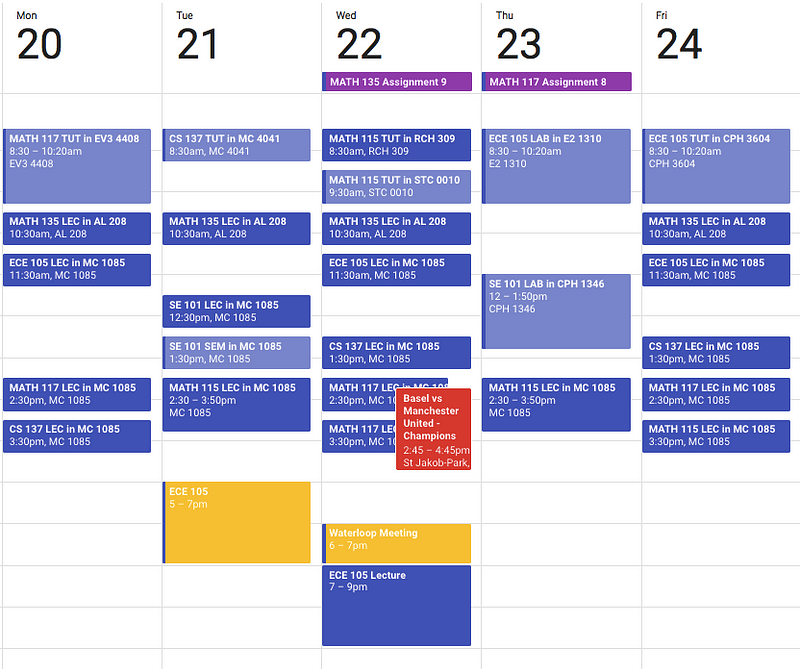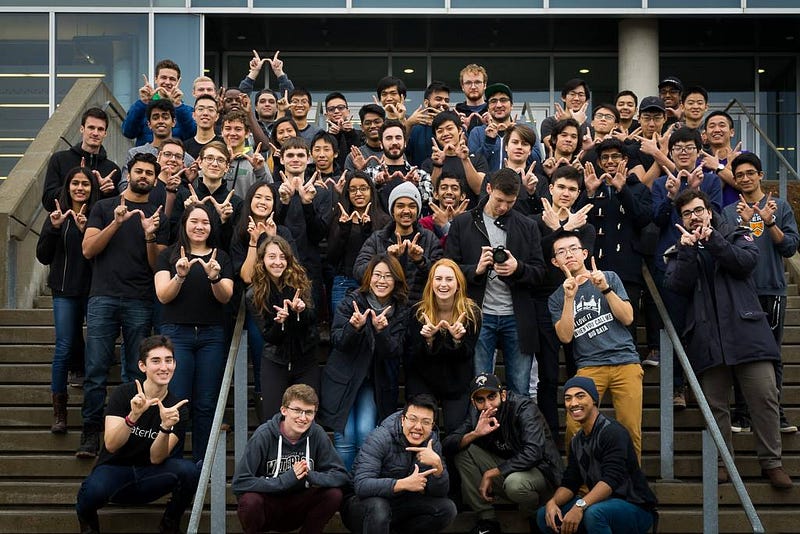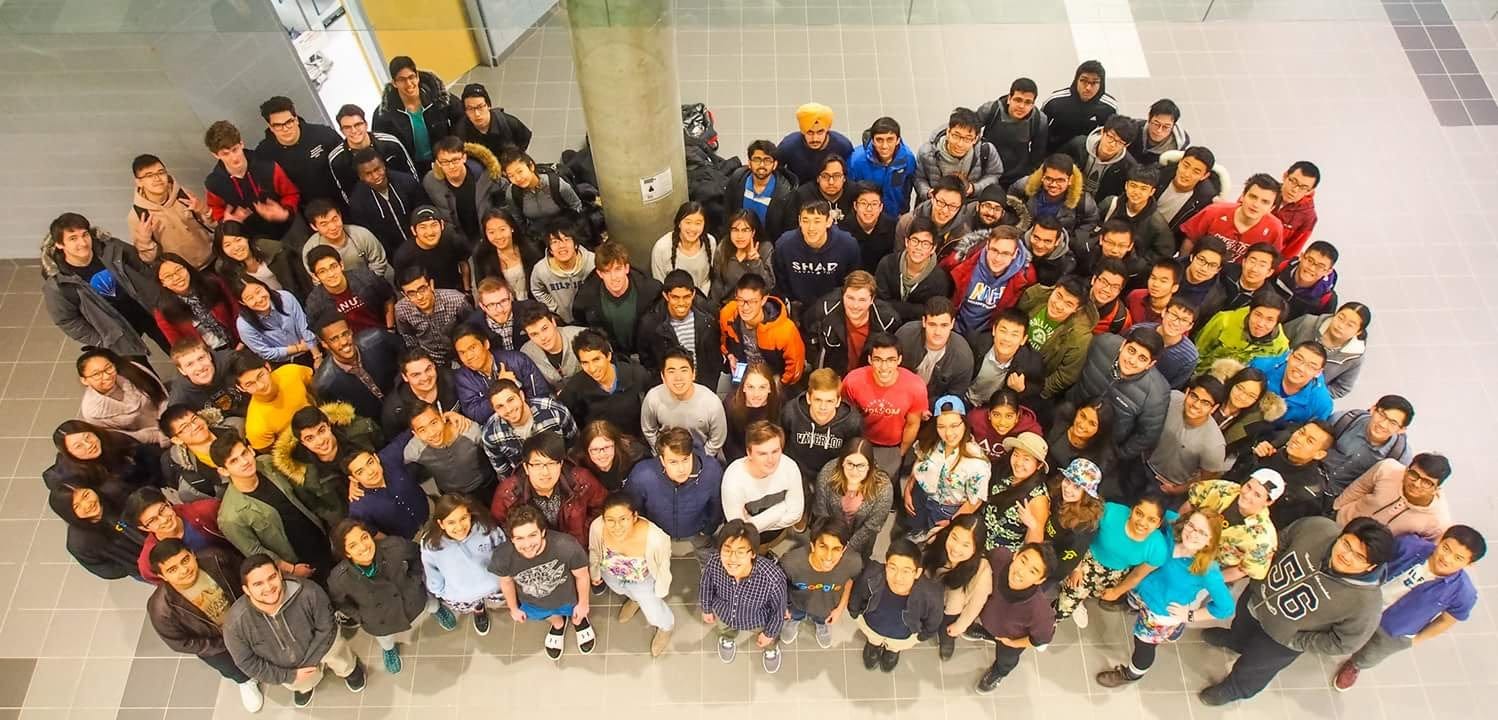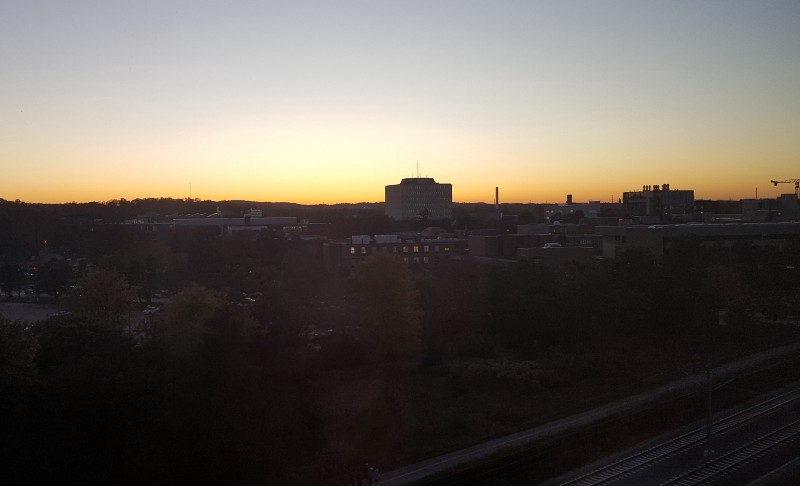It’s that time of the year again, when many high school seniors have their sights set on University. It can be a stressful transition period, but it can also be one of the most exciting times in your life. I recently finished my first year at Waterloo for Software Engineering, and wanted to give a quick overview of my experiences and answer some common questions.
Academics
It’s no surprise that university is tougher than high school — there’s no denying that. I often get asked,
Are my grades going to drop 20% from high school?
First, a bit of background on myself. In my first year of high school, I wasn’t doing as well as I should have been — and I was content with it. It actually took me until grade 11 to realize I had more to offer, and from then on I’m very proud of what I was able to accomplish. Wait… what does this have to do with university?
My point is, everyone is going to tell you that you’re not going to do as well academically in university than you did in high school. And that’s true for the most part, it is a big jump. Your expectations should lower. But your goals don’t have to. You shouldn’t let what other people say define your goals. You don’t have to be content with lower grades just because everyone says it happens.
That’s not to say you should approach university with the same mindset as high school. When I began to receive my first few assignment marks at the beginning of the year, I was seeing lower numbers, for sure. But, as the term went on, I began to adjust to the style, and eventually was reaching similar heights as in high school. Have faith in yourself!
Don’t get me wrong, if you’re struggling to find your feet, it is absolutely nothing to be ashamed of. It’s tough to adjust to a new style of life, and it’s completely normal to not get things right the first time.
However, don’t get hung up on grades, bad or good. If they’re not what you want to see, keep working hard, seeking help, and they will come. If they are what you want to see, be proud, but move on. Grades aren’t everything!
How many hours of class do you have per week?
Engineering programs typically have more lectures than other programs — but it looks worse than it really is. Here’s a sample week of my first term at Waterloo.

22 hours of lectures, 7 hours of tutorials, and 4 hours of labs, so roughly 33 hours per week in class. It sounds worse than it is – not every tutorial is worth going to (go to the ones which have mandatory quizzes, but if not and you’re comfortable with the course material, you don’t need to go). Also, SE101 was a pretty relaxed course.
Do you drink 4 cups of coffee and get 4 hours of sleep a night?
Actually, no. If you manage your time well, you can get however much sleep you want. I don’t think I ever had to study past 10:30pm in first year, and slept 8 hours pretty much every night. Haven’t had coffee in years. I was able to balance extracurriculars, going home to visit family, and continued freelancing on the side. I have a lot to improve, but it’s definitely do-able!
Is there a competitive culture?
Honestly, going into university I thought it would be very competitive. I was definitely wrong — most people help answer your questions and share resources with the class. I post my notes on my website to help out those who miss lectures. At least in SE, it feels like everyone’s in it together. For example, when there’s a practice exam without professor-approved solutions, we make a crowdsourced Google Doc and everyone adds their answers (usually pretty reliable given the amount of people in the program).
Motivation and Workaholism
Do grades even matter anymore, as long as you pass?
In a program where most people are planning on not pursuing post-undergraduate studies, this gets asked a lot. Good grades don’t significantly increase your chance of getting hired, although they definitely help.
For me, I could not care less about the number on the page. But that’s not because I don’t care about school, it’s because I don’t work hard to get good grades, I work hard because I want to work hard. Personally, I like to hold myself to a certain standard of living, and that has always included trying my best in school to get the most out of the experience. Quite honestly, I never understood why some people come to university and completely stop trying because grades “don’t matter anymore”. You’re here to learn, why are you not making the most of it? Personally, it’s not the way I want to live my life.
However, I do self-identify as a workaholic. I genuinely enjoy working and have strong feelings of guilt when I’m not being productive (this is not a good mentality and is something I’m working to diffuse). So, maybe take what I say with a grain of salt. But before you begin university, definitely ask yourself what your values are. Why do you work hard? Why are you attending university?
Co-op
Probably Waterloo’s biggest attraction is their emphasis on co-op. It’s a great way to gain quality, paid experience in your field, and graduate pretty much debt free.
How many interviews can you expect in first year?
Not a lot, to be honest. First years have the toughest time finding jobs, since you’re the least experienced candidates at the university. I was lucky in the sense that I had two previous jobs in software development and freelance experience, but most people get around 3-5 interviews. If you do have previous job experience though, you could see around 10–15.
If you are currently in grade 12 and going to a co-op program next year, I highly recommend you get some experience in your field this summer. It takes a lot of stress off knowing that you have a job to return to in case you’re struggling to find something during school, and even just being qualified for more jobs than most first years. Conveniently, Tech Under 20 is hosting our Learn How 2 Get Hired event soon. If you’re in the Halton region looking for a job in tech/business, this is a great opportunity!
That being said, do take some time to relax as well in your summer before university! A job in your field can help, but don’t stress too much.
What are interviews like?
Most of my interviews were half behavioural, half technical. They typically last around 30 minutes to 1 hour, usually beginning with getting to know you and then transitioning into coding problems. For the interviews I had that were online, I did actual coding, whereas in-person were mostly whiteboard problems. But, be prepared for technical questions. Know your algorithms and do lots of practice! If you can show the interviewer that you know your CS, they won’t care that you’re a first year student.
Is it hard to balance your job search with academics?
Sometimes, yes. It takes effort to perfect your resume, apply to the right jobs, and prepare for and attend interviews. If you have an interview scheduled at the same time as a lecture, you’re required to attend the interview. It also did not help that 3 of my biggest interviews were during midterm week. But plan accordingly, and you’ll be okay.
Extracurriculars
One substantial difference between university and high school is the sheer amount of clubs that you have to your disposal. Seriously — if you can dream up a club, chances are, your university has one. In the early weeks I joined a student design team, Waterloop, doing back-end software development. If you find a design team that you like at your school, try it out! They’re slightly different from clubs — they’re more technical and project based. It’s a great experience to learn new things, meet people in different programs and years, and collectively work towards a goal. For us, that goal was creating a pod to compete in SpaceX’s Hyperloop competition.

Later in the term, I also joined fustal (aka indoor soccer) intramurals with some friends (shoutout to Nuts and Bolts). Intramurals is an awesome way to relieve stress and get involved with sports. Let’s ignore the fact that we lost every game, though…
Social Life
Is the social life at Waterloo / in Engineering really that bad?
It’s really not! It’s very easy to make friends, especially if you have a cohort (which all Engineering programs at Waterloo do). Most people are pretty friendly and outgoing, and there are many social events going on throughout the term, such as the Math and Engineering Semi-Formals.

How are the residence communities?
Personally, I had a great experience. I stayed at NRB (now called CMH), and had an amazing time. Everyone on my floor was friendly, and it was definitely sad to see it end. If you can live on residence in your first year, I recommend it! Just be ready to get sick of caf food pretty quickly.
Tips and Final Remarks
Some general tips:
-
- Go to your lectures, at least until you know you can manage without them. But you’re paying for them regardless, so why not?
- Don’t doubt yourself. You’ll be surrounded by even more high achieving students than in high school. Just remember you’re just as capable (the university admitted you for a reason), and it’s not a competition regardless.
- Enjoy what you’re learning. If you don’t enjoy it, what’s the point, really?
- Take care of yourself. Sleep, exercise, and eat well. It makes a huge difference. Your health (physical and mental) is most important.
All in all, university is one of the most exciting times in your life. You meet many new people and have a new sense of independence. Although the academics can be overwhelming at times, don’t forget to have fun! I’ve definitely enjoyed it, but I’m glad it’s over and excited to start co-op at Thomson Reuters in Toronto. If you have any questions, feel free to reach out!

